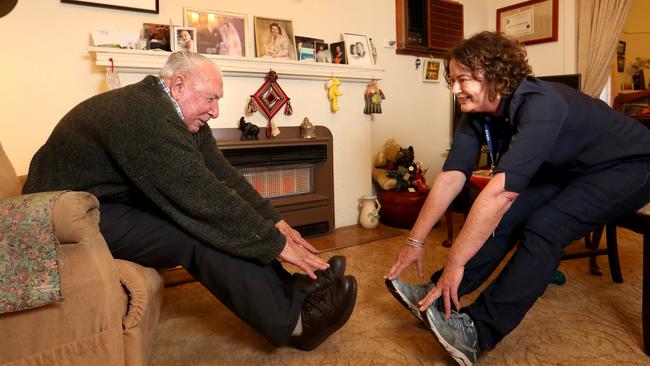Coronavirus: Changi survivor exercises patience but missing mates
‘(The lockdown has) made a big difference to my life. Being compliant has been hard,’ says 99-year-old Frank Holland-Stabback.

World War II veteran Frank Holland-Stabback knows a thing or two about confinement — he was a prisoner of war in Singapore for 3½ years from 1942, including eight months in a Changi cell.
This time, the 99-year-old is confined in more comfortable surroundings, the home he built in 1952 at Sandringham in Melbourne’s southeast for wife Lillian, the love of his life who died 15 years ago after 57 years of marriage.
Confined he is, though, the COVID-19 pandemic putting paid to plans for a 100th birthday bash in August and closing the council-run activity group where he has been going two days a week at least for the past eight years.
“I’ve always been a sociable person,’’ he said. “I learned early in my life what it is to want, what it is to need people, and what it means to give back to others. That’s what the Black Rock Activity Group has given me. (The lockdown has) made a big difference to my life. Being compliant has been hard. The quicker we can get back to a normal routine, the better.”
The group’s shutdown led the Bayside City Council to redeploy those who ran activity programs to instead visit participants in their homes. While Mr Holland-Stabback has been quick to take advantage of home support, many older Australians are more reluctant
A national study by aged-care provider representatives Leading Age Services Australia finds some in-home care providers have lost up to 30 per cent of clients because of concerns over COVID-19.
Anxiety about the outbreak and the isolation caused by the response has been high among this group, which doesn’t have the in-built community of a nursing home. The survey found 40 per cent of homecare providers said infection fears had affected their clients’ wellbeing “a great deal” or “a lot”: 42 per cent said isolation affected the wellbeing of clients “a great deal” or “a lot”.
Many providers have significantly increased the provision of social support, meal services and transport for clients who have little or no other personal contact.
“Care services have worked tirelessly to minimise the impact of coronavirus on the mental and physical wellbeing of their home-based clients,” said LASA chief executive Sean Rooney.
“Providers … are constantly monitoring people, including those who have decided to cancel services, to help reduce the trauma and make sure they are OK.”
Mr Holland-Stabback used to have a carer go with him to do his shopping, but they now do it for him. And his exercise regime is done through home visits rather than with the activity group. “It’s a wonderful group down there … I’m really missing them,” he said.




To join the conversation, please log in. Don't have an account? Register
Join the conversation, you are commenting as Logout